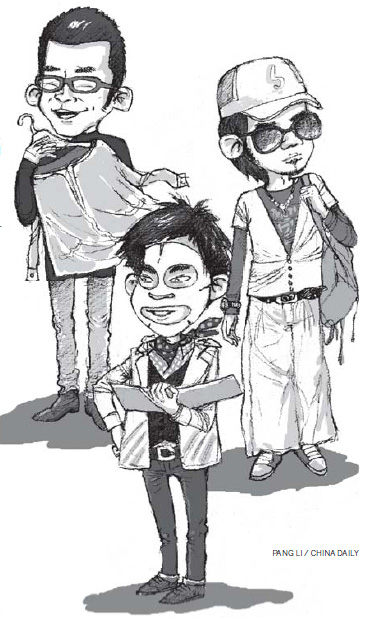Op-Ed Contributors
Debate: Metrosexuals
(China Daily)
Updated: 2011-02-14 07:46
 |
Large Medium Small |
Fumiyo Layman
Chinese men becoming 'herbivores'
After recent reports on China's booming cosmetic market for men, du shi yu nan, the Chinese term for metrosexuals, has become a new concept for understanding men's changing role in Chinese society. According to Euromonitor International, sales of men's health and beauty products in China were estimated to be $269 million last year, more than that in North America in 2010. Sales are expected to grow significantly this year, too.
Undoubtedly, more young Chinese men are buying cosmetic products than before. But it would be too superficial to call all young Chinese men who buy such products metrosexuals. Besides, most young Chinese men don't want to be identified as du shi yu nan.
If we analyze such gender-neutral men's behavior further, we may find this trend to be associated with China's changing society. Japan, too, has seen the emergence of gender-neutral young men. The Japanese term, soushokukei, or "herbivore men" in English, was coined by Japanese pop culture columnist Maki Fukasawa in 2006 to describe young Japanese men who have little interest in sex, material possessions and social competition but have a keen interest in their appearance and latest fashion trends.
Perhaps it would be more appropriate to consider the young "elegant" Chinese men as soushokukei because they share so many similarities.
The word soushokukei in Japan is not necessarily seen as a negative term among young Japanese men. While many young Japanese men believe that becoming a "herbivore" means being released from traditional Japanese masculinity - the typical image of men during Japan's military history in the early 19th century and the rapid economic development in the post-World War II era - Japanese society has serious concerns about their social role.
A professor of Sociology at Tokyo's Chuo University has said that Japanese women wish to marry men who earn at least 6 million yen ($72,000) a year, even though such men make up only 3.5 percent of the eligible bachelors in Japan. Besides, most of the herbivorous men, who have little interest in social status and intimate relationships, do not fall in this category. The result of such unrealistic female expectations is a generation of men (and women), who may never marry and have children.
There are societal factors behind the emergence of herbivorous men. A joint online survey in 2009 showed how women view young Chinese men: More than 80 percent of young Chinese women think their male counterparts have become weaker and more gender neutral than before; 40 percent of the women consider their male colleagues smart and ambitious; and only 20 percent find the men masculine. Similar to Japan's experiences, China is seeing the rise of gender-neutral herbivorous men.
How can we distinguish such herbivorous men from "traditional" Chinese men? One significant difference between them is that the herbivorous men were born in middle and late 1980s to early 1990s and raised during China's economic boom. Moreover, they are the only child of their parents.
But it is no point making a fuss about such a phenomenon. As China's economy grows rapidly, people are becoming increasingly rich, and youths have the capability to spend more money on make-up and clothes. Hence, it is partly a reflection of the improvement in people's incomes and livelihood, and most of the youths try to be "gender-neutral" just because "it is fashionable or cool" without hindering their "competitiveness".
Some Chinese scholars propose other response as well.
He Chunrui, a professor at the Gender Research Institute in Taiwan Central University has scrutinized the results of Internet surveys, and argues that white-collar male workers tend to become gender neutral in China because they are educated, and enjoy social status and financial stability. The corollary is that they do not need to exhibit masculinity to attract women.
Pan Suiming, a professor and director of the Institute for Research on Sexuality and Gender in Renmin University of China, argues that, while Chinese society in general has become more casual about sex, some young Chinese men have been "left behind" for lack of romance during their college years. He emphasizes that experiencing intimate relationships, not in the virtual but the real world, is as important as academic achievements during college years.
If gender neutrality, signified by metrosexuals, is one way of self-representation or a reflection of young men's increasing ability to pursue their own choice of values, such choices and behaviors should be respected and accepted.
Such a phenomenon is a natural result of a growing pluralistic society, and people should be open-minded toward different groups of youths as long as their behavior doesn't interfere with other people's lives.
The author is a freelance writer from Japan.

(China Daily 02/14/2011 page9)
| 分享按钮 |